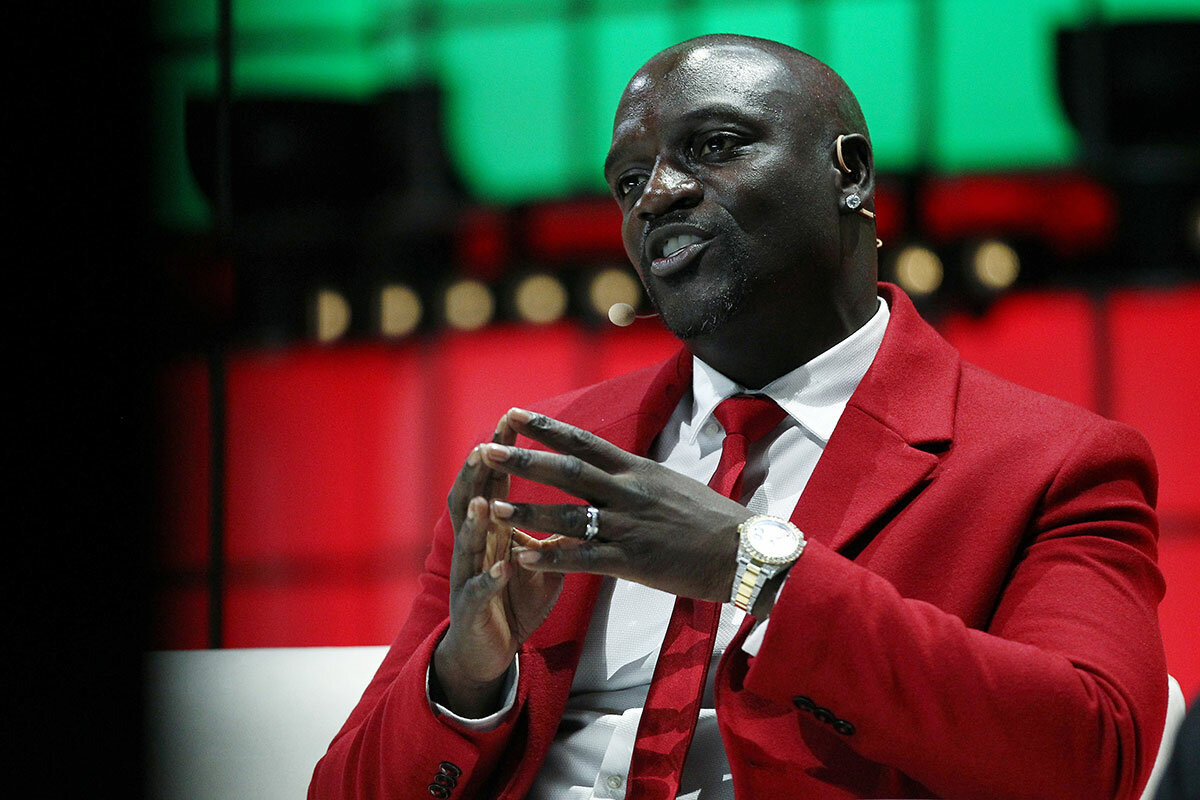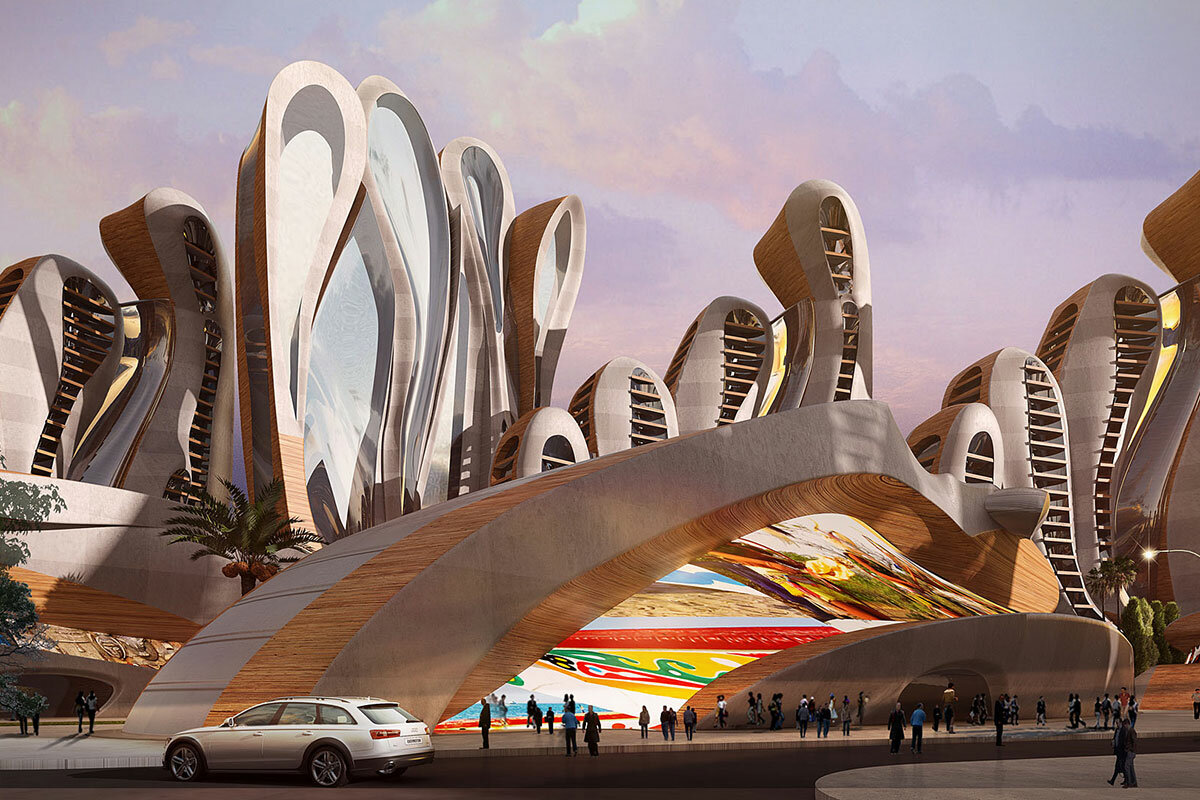When an R&B star vows to build a futuristic city in your backyard
Loading...
| Mbodiène, Senegal
There’s a deep quality to the stillness in Mbodiène. In the middle of this small coastal town stand two mighty kapok trees, their spreading branches casting shade over the square. Dusty pathways lead off the square to single-story cement homes – there are no tarred roads here.
On a recent afternoon, a bell rings and a kindergarten spews out a dozen or so kids into the square. Across the field, their excited chatter is barely audible, the trees seeming to absorb all sounds.
Home to mostly fishers and farmers, known only for bird-watching, Mbodiène has always been quiet. But a massive project spearheaded by Senegalese American singer Akon could soon change that. Humble Mbodiène has been picked as the site of Akon City, a futuristic “smart city” projected to cost billions and take a decade to complete.
Why We Wrote This
Akon City has been compared to Wakanda: the fictional city in “Black Panther” that captured imaginations, giving a much-needed revamp to images of Africa. But Akon City’s no symbol. Its success or failure will have real consequences – and for no one more than the people next door.
In architects’ sketches, the unbuilt Senegalese city is a labyrinth of warped metal and glass, with miles of palm-lined roads – a scene from science fiction. Undulating rose-gold towers reach up toward the sky, their vast windows and curves reflecting the sea in front of them. And onto that backdrop, observers near and far have projected all sorts of visions, long before a single building goes up.
The singer has called his city a refuge for the African diaspora, and “the beginning of Africa’s future”. He says it will boost Senegal’s economy and attract other foreign investments, including in tourism. Journalists have compared it to Wakanda in the blockbuster “Black Panther.” Others deride the project as an unrealistic stunt.
But how about Akon’s neighbors in Mbodiène? How will they benefit from the experiment next door?
“Never have we had a project this big, that not only Senegal is talking about but Africa and the world,” says 30-year-old Joachim Jean-Marc Diouf, a leader of Mbodiène’s youth association.
Like many young people in Mbodiène, Mr. Diouf was born here but had to leave for secondary and college training. The closest universities and hospitals are in Mbour or the capital Dakar, both at least an hour away. It is one reason why many here eagerly await Akon City, which would have a school and a hospital offering free care to locals.
Akon’s ambition
Aliaune Damala Badara Akon Thiam was born in the U.S., but spent much of his childhood in Senegal before moving to New Jersey at age 11. In recent years, the R&B artist has added philanthropy to his portfolio, including a youth empowerment organization in Senegal, and a solar-energy nonprofit that operates across the continent.
He first announced Akon City in 2018, in a shock to Mbodiène’s 6,000-strong population. It will be the first of many smart cities in Africa, Akon has said, built in part for the Black diaspora.
“The system back home treats them unfairly in so many different ways that you can never imagine. And they only go through it because they feel that there is no other way,” Akon told reporters last year. “So if you’re coming from America or Europe or elsewhere in the diaspora and you feel that you want to visit Africa, we want Senegal to be your first stop.”
Like Wakanda, Akon City aims to be technologically advanced, incorporating cutting-edge innovation into luxury resorts, high-rise apartments, recording studios, a stadium, and a helipad. It will be stretched over 2,000 acres of coastal land acquired from the Senegalese government, run on a cryptocurrency named Akoin, and generate its electricity through Akon’s Lighting Africa project. Two-thirds of the budgeted $6 billion has been secured, according to builder KE International, but the only named investor is Julius Mwale – a tech entrepreneur who also invested in another “smart city” in Kenya.
Last September, Akon laid the first brick in a kickoff ceremony that saw journalists flood Mbodiène. Construction, he said, would begin in 2021. For now, though, the land that will be transformed is still a plain cornfield.
Hopes for work
A few days before the public briefing, Akon visited the people of Mbodiène to seek their blessings. Donning a blue kaftan, the star told young and old alike that Akon City would not succeed without their cooperation.
He won many hearts with the move: Choosing to meet residents before the official ceremony signaled respect and a willingness to tread with caution, both valued traits in West African culture.
Mr. Diouf, sporting a striped polo, admits it’s a bit disconcerting to suddenly be the center of attention. But for now, the excitement many feel outweighs that.
“Just like in many small villages in Senegal, we have many youths who don’t have jobs, and when the construction starts in 2021, we are expecting Akon to offer some important jobs to the youth of Mbodiène,” he says.
Paul Martin, director of the Akon City Project at KE International, writes in an email that they will “employ thousands of locals throughout the project lifecycle. Many of the jobs will be permanent.”
Louise Sarr, a retired educator, is passionate about including Mbodiène’s women in the opportunities ahead. No-nonsense but motherly, Ms. Sarr is revered here, and consults for a women’s association offering small loans for businesses.
“We know Akon may not be able to do everything that he has promised, but at least we want him to finance some of the projects that are the most important to us,” she says. About 500 women in Mbodiène need jobs, she says, and her informal group has presented plans for Akon to consider, such as fish-processing plants.
He’s promised to help, she says, and she hopes that he will keep his word. “We saw that he has been very active with the young men, why not the women too?”
“We are staying calm”
Heavy criticism trails Akon City. Many have mocked it as delusional, and others question how it can symbolize “Africa’s future,” when it has been designed by an Abu Dhabi-based architect and is due to be built by a U.S.-based developer.
Some say Akon’s vision will benefit only the wealthy and tourists. Already, some locals have lost farmland: The land the city would be built on was acquired by the government in the 90’s for tourism, residents say, after increased salinity levels made it difficult to grow anything. Some are still awaiting payment. Senegal’s tourism agency has not responded to questions about Akon City’s agreements to protect locals.
“The skepticism around Akon’s project is related to the fact that people are used to seeing big politicians promise but not deliver,” says Az Momar Lo, a Dakar-based fact-checker and journalist with Africa Check, whose requests to see the fine print of agreements between the government and Akon’s team went unanswered.
Then there’s the mystery of the location, although many point out that Mbodiène is close to a recently built international airport. “Mbodiène itself [is] a village off the beaten path. When you take a small village and say you want to build a futuristic city, there is room for doubt,” Mr. Lo says. “If it were a known city like Dakar, maybe no one would be concerned. But Mbodiène, why there?”
In Mbodiène, though, most are choosing optimism.
“People have been saying maybe this project will not directly benefit the dwellers of Mbodiène and maybe it will only benefit Akon and the capitalists. But as for us, we are staying calm,” Mr. Diouf says. “With such a huge project like a futuristic city, it is only fitting that a futuristic village is beside it.”







